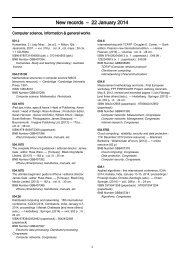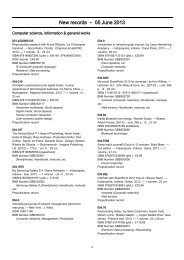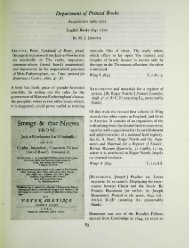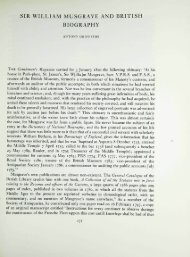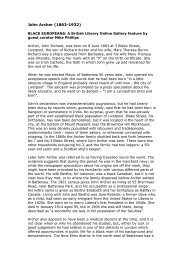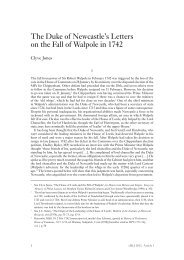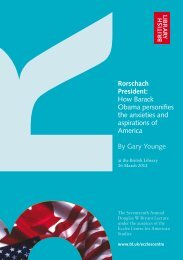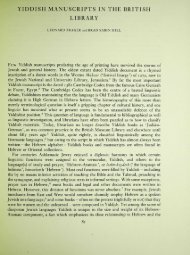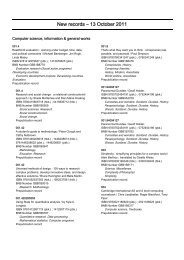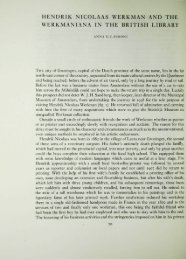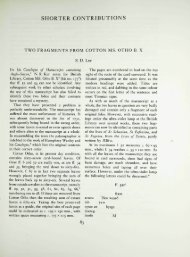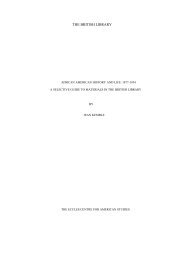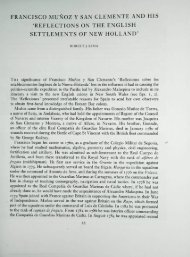A Medieval Psalter 'Perfected': Eighteenth-Century ... - British Library
A Medieval Psalter 'Perfected': Eighteenth-Century ... - British Library
A Medieval Psalter 'Perfected': Eighteenth-Century ... - British Library
Create successful ePaper yourself
Turn your PDF publications into a flip-book with our unique Google optimized e-Paper software.
A <strong>Medieval</strong> <strong>Psalter</strong> ‘Perfected’: <strong>Eighteenth</strong>-<strong>Century</strong> Conservationism and an Early (Female) Restorer<br />
of Rare Books and Manuscripts<br />
valuable collections in Europe; at that time, it could only be surpassed by the theological<br />
library of the Duke of Wirtemburg; for His Royal Highness the Duke of Sussex had not then<br />
begun his invaluable Manuscript collections’. 11 Considering the luminaries who collected<br />
manuscripts, incunables and early printed books during this era, we should probably<br />
approach this assessment of Denyer’s collection with scepticism; 12 nevertheless, he does<br />
appear to have acquired in his own day a reputation as a regarded collector. He corresponded<br />
with the better-known William Herbert (1718-1795), 13 who even acknowledged Denyer in<br />
the foreword to Ames and Dibdin’s Typographical Antiquities of Great Britain, and from whom<br />
he acquired at least one book. 14 Little else about John Denyer is known beyond a brief line<br />
in his daughter’s will, which intimates a creative character and perhaps a devoted father: to<br />
her friend Henry Virtue Tebbs (1797-1876), Elizabeth left ‘all the manuscript ffables wrote<br />
by my ffather in round frames now in my own room’. 15 Before his death, John prepared a<br />
will which bequeathed all of his possessions to his daughter Elizabeth, which we can take to<br />
include his collection of rare books. 16 In 1806, John died and was interred alongside his wife<br />
Martha in Milman Chapel of Chelsea Old Church. 17<br />
Despite her obscurity, a substantial will that Eliza prepared in 1821 avails at least some<br />
information about her activities and character. She never married and had no children, which<br />
led her to leave some of her estate to friends and extended family, and the vast majority to<br />
charitable institutions. Among the charities she supported were the Society for Preventing<br />
the Use of Climbing Boys as Chimney Sweepers, 18 various organizations for the promotion of<br />
11<br />
Faulkner, An Historical and Topographical Description of Chelsea, vol. i, p. 261. Other references to Denyer as<br />
a collector of rare books include: George Bryan, Chelsea in the Olden and Present Times (Chelsea, 1869), p. 91;<br />
Charles Wentworth Dilke, ‘Chelsea: A Lecture Delivered in the Town Hall, Chelsea ... on Wednesday, January<br />
11th, 1888’, LSE Selected Pamphlets (1888), p. 9; and Walter H. Godfrey, Survey of London, pt. ii, p. 66.<br />
12<br />
Just some of the prominent names include Sir Hans Sloane, Francis Douce, William Hunter, James Edwards,<br />
Sir Andrew Fountaine, Sir William Petty, Charles Burney, Richard Rawlinson, Edmund Malone, John Soane,<br />
and Anthony Morris Storer. See Seymour De Ricci, English Collectors of Books and Manuscripts (1530-1930)<br />
and Their Marks of Ownership (Cambridge, 1930), pp. 54-70; William Baker and Kenneth Womack (eds.), Pre-<br />
Nineteenth-<strong>Century</strong> <strong>British</strong> Book Collectors and Bibliographers, Dictionary of Literary Biography, vol. ccxiii<br />
(Detroit, 1999); and Nigel Ramsay, ‘Libraries for Antiquaries and Heralds’, in Giles Mandelbrote and K.<br />
A. Manley (eds.), The Cambridge History of Libraries in Britain and Ireland, 1640–1850 (Cambridge, 2006),<br />
pp. 134-57 (esp. pp. 150-7).<br />
13<br />
Robin Myers, ‘Herbert, William (1718–1795)’, Oxford Dictionary of National Biography, Oxford University<br />
Press, 2004; online edn, Jan 2008 [http://www.oxforddnb.com/view/article/13062, accessed 20 July 2012].<br />
14<br />
J. Ames, T. F. Dibdin and W. Herbert, Typographical Antiquities of Great Britain (London, 1810), p. 66. See<br />
Appendix B, item 40, for a transcription of a letter written by Herbert to Denyer in 1786. Oxford, Bodleian<br />
<strong>Library</strong>, Denyer 21 (1) contains the initials of William Herbert on a flyleaf.<br />
15<br />
TNA, Prob,11/1685.<br />
16<br />
TNA, Prob, 11/1436.<br />
17<br />
An inscription on their memorial tablets reads: ‘Sacred to the memory of John and Martha Denyer / The<br />
best of Parents, and the best of Friends / Who resigned this mortal life in a well grounded hope / of a Joyful<br />
Resurrection to Eternal Life / through Faith in the alone merits / of our Lord and Saviour Jesus Christ /<br />
They lived together in great connubial Happiness / Forty two years and died / Martha on the 18th Day of<br />
January. 1795 Aged 64 Years / and John on the 6th Day of January. 1806 Aged 76 Years’ (‘Chelsea Old Church:<br />
Monuments in the Chancel’, Survey of London, vol. vii: Chelsea, part III: The Old Church (1921), pp. 14-28.<br />
18<br />
This bequest was specifically intended ‘by way of reward to any person who shall invent or bring to perfection<br />
any machine which shall be approved of by Parliament and which shall thereby prevent the use and employment<br />
of climbing boys for sweeping chimneys’ (TNA, Prob, 11/1685). The invention that appears to have come<br />
the closest to qualifying for this reward was denied parliamentary approval. See George L. Phillips, ‘The<br />
Abolition of Climbing Boys’, American Journal of Economics and Sociology, ix (1950), pp. 445-62.<br />
7<br />
eBLJ 2013, Article 3



